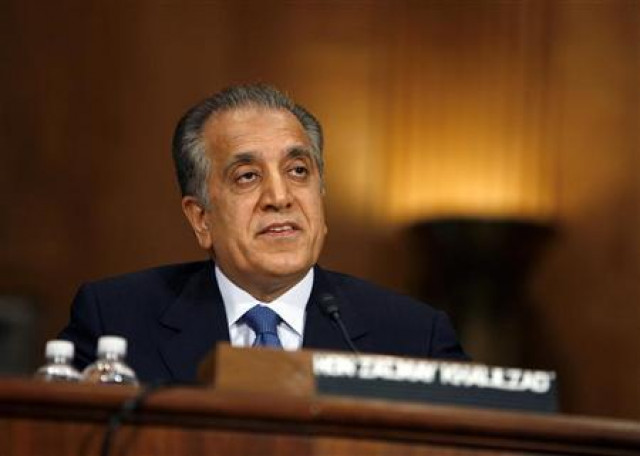Khalilzad’s spoiler alert
Let us hope that the shadow war waged against peace is lost.

United States Special Envoy for Afghanistan Zalmay Khalilzad. PHOTO: REUTERS
This time around, the US is not asking the Taliban to shake hands with the Kabul regime before the formal agreement has been signed and announced. The seven-day “reduction in violence” would most likely begin this week. Its purpose is like a secured credit card which, if used responsibly, is followed by a real, unsecured credit card. It allows the Taliban to honour the American demand and demonstrate a rigid command and control by ordering their soldiers to stand down and ensuring it actually happens.
Because let’s not forget that for the US to withdraw from Afghanistan, the real quid pro quo is for the Taliban not to allow their soil to be used by any foreign terror group for the planning of terrorist attacks against America. If the Taliban demonstrate the will and ability to reduce violence, it would be viewed as a testament to their ability to do the same after the Americans have left town.
Zalmay Khalilzad had been at the forefront of this entire effort. Khalilzad said that he is “cautiously optimistic” because there are “spoilers” whose interest lie in keeping the war going. Khalilzad was not only “cautiously optimistic” but also cautiously noncommittal by choosing the word “spoilers” instead of Indian shenanigans.
One of those “spoilers” has just occurred. On Tuesday, Ashraf Ghani was declared the winner of the Afghan presidential election five months after it occurred. The timing could not have been more revealing and devilish. This announcement is clearly done to pre-empt the seven-day peace to be observed in Afghanistan. The election had seen the lowest turnout in 18 years — fewer than two million voters despite nine million registered voters — and was marred by massive ballot fraud and disillusionment with the political process.
Ghani’s main rival Abdullah Abdullah has declared the announcement a “national treason” and threatened to form a parallel government of his own. He is backed by the powerful strongman, General Abdul Rashid Dostum, who said, “Even if they put a knife on my throat, even if they hang me, I will not accept an announcement based on fraud.” Abdullah’s campaign chief hinted at resorting to the use of force if it comes to that. In a not-so-veiled threat, he warned, “Democracy, election and civil values are not functional in this country as whoever captures power tries to maintain it with any cunning possible. The only way for obtaining power is force.”
This creates uncertainty as to who would the Taliban be talking to once the deal with the Americans has been signed. Last time, the spoiler was Ghani because he wanted his hand shaken by the Taliban and this time it is him again because he wants to snatch the presidency fraudulently. Those with a vested interest to continue the war have pulled an intelligent trick: since the Americans can no longer be persuaded to continue the war, other players of the larger deal are moved around so to derail the peace process. The fate of the seven-day calm is now in question as a bumpy road follows Tuesday’s developments. Let us hope that the shadow war waged against peace is lost.
Published in The Express Tribune, February 20th, 2020.
Like Opinion & Editorial on Facebook, follow @ETOpEd on Twitter to receive all updates on all our daily pieces.














COMMENTS
Comments are moderated and generally will be posted if they are on-topic and not abusive.
For more information, please see our Comments FAQ